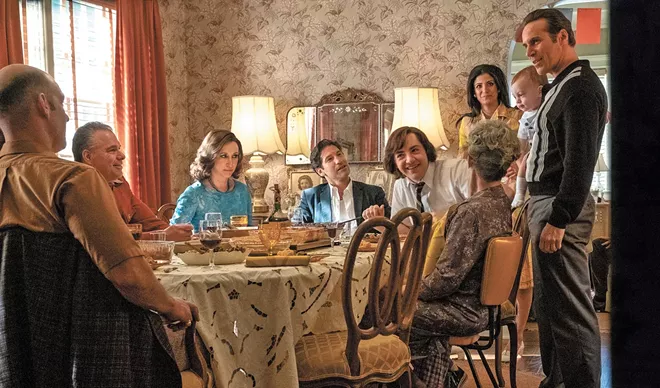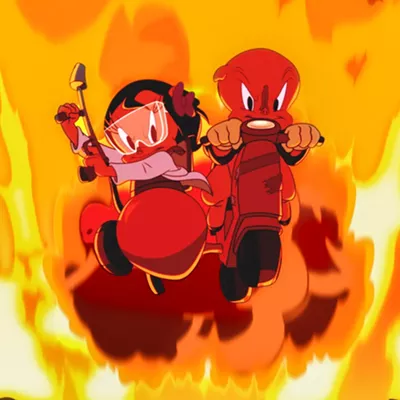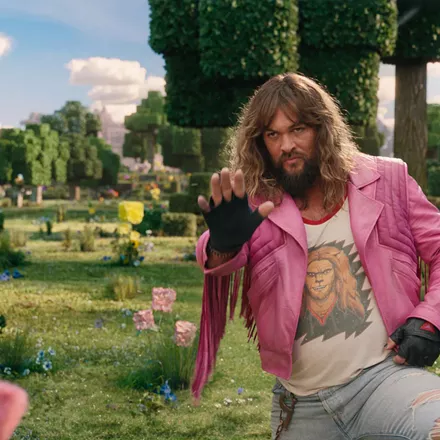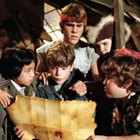It's a great title: The Many Saints of Newark. It's memorable, unusual, and most of all ironic, because this is a movie about mafia gangsters, and mob guys are the furthest things from saints. But it's also just plain factual, in a way, for this movie is specifically about Dickie Moltisanti, criminal mentor to Tony Soprano and father to Christopher Moltisanti, central figures in the legendary, much-loved, and highly praised 1999–2007 HBO TV series The Sopranos. "Moltisanti"? It's Italian for "many saints."
Here's the thing, though: Did we need a Tony Soprano origin story? For that is also what Many Saints is, a fleshing out of Dickie — who was dead by the era the TV show is set in yet whose spirit loomed over it in numerous ways — so that we may see how he influenced young Tony. But wasn't The Sopranos itself pretty much all about Tony trying to unravel, with the help of his therapist, where he came from, psychologically, and why he was the way he was?
So, alas, Many Saints feels redundant, and in more ways than one. Series creator David Chase is back here, having written the script with Lawrence Konner, and director Alan Taylor also directed a bunch of episodes of The Sopranos, yet this feels more like Goodfellas-lite than The Sopranos. There's little of the introspection and intriguing self-awareness that made the series such an unexpected joy to watch, which is perhaps not surprising: a movie is not a TV show. But there's several TV seasons' worth of story crammed into Many Saints, to the point where the elisions needed to make it all fit into two hours sometimes become distractingly confusing or exasperating.
One big example: Is it Dickie's wife or his mistress who gives birth to baby Christopher? It's the sort of thing that knocks you right out of the story as you attempt to decode the clues the script has littered up to this point... but it's not intended to be a mystery. It doesn't help that the actresses in the roles, respectively, Gabriella Piazza and Lesli Margherita, look very alike. And it's indicative of the short shrift the female characters get, even when they're meant to be key to understanding the unexamined hypocrisies and explosive violence of Dickie's personality. The women here are sacrificed to men's journeys, literally and figuratively, in a way all too familiar onscreen... which was not the case with The Sopranos (or with Goodfellas, either).
There are saving graces to this often trying movie. The terrific cast turn in spectacular performances. Alessandro Nivola is riveting as Dickie, and gives him more depth than the script does. Ray Liotta does some of his best work since perhaps Goodfellas itself as an elder Moltisanti who becomes an unlikely sounding board for Dickie. Vera Farmiga as Livia, Tony's mother, elbows her way into a bigger role than the movie wants to give her room for, letting quiet moments speak to Livia's frustrations and disappointments with her husband — mobster Johnny Boy (Jon Bernthal), who is often away in prison — and how her unhappiness affects Tony. And it is beyond poignant to see Michael Gandolfini, son of the late Sopranos star James, damn near bring the gone-too-soon actor back to life as the teenaged Tony. Gandolfini not only looks like his father, embodying Tony in a way that avoids impersonation, but he manages the same roiling depth of feeling in his baleful, angry glare, which does more to make Tony real that almost anything we see happen here. (William Ludwig plays a grade school Tony early in the film.)
The evocation of the period is striking, too, from the mid 1960s through the mid 1970s. (There's a scene with a Mister Softee ice cream truck that slammed me right back to my 1970s suburban New York childhood, just for how right it gets the look and feel.) But the volatility of the era — there is a long sequence during the first half of the movie set during Newark's 1967 race riots — is a story in itself, and is perhaps the most unforgivable shortcut the movie takes. Much of the conflict in Dickie's journey comes from clashes with a former criminal colleague, Harold McBrayer (Leslie Odom Jr), who decides to go into rival felonious business on his own. Odom is mesmerizing, and Harold deserves his own movie, not least because White filmmakers using Black pain as a backdrop and an opportunity for the growth of White characters is yet another tired cinematic cliché that The Many Saints of Newark indulges in. Anyone who loves The Sopranos and appreciates how it continually upended stereotypes is excused from expecting more from this film. ♦
Directed by Alan Taylor





























